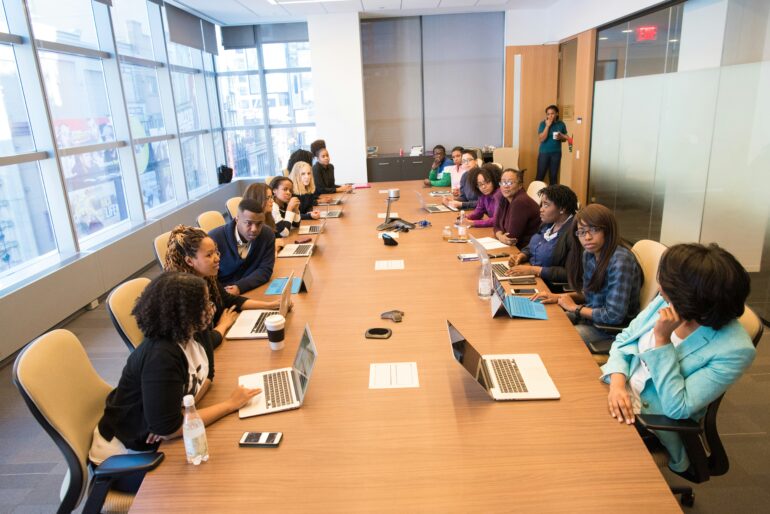In 2020, President Donald Trump signed an executive order revoking all federal government diversity, education, and inclusion (DEI) training. While several lawsuits followed that order, and President Joe Biden has since reversed the ban on DEI training, federal government agencies, businesses, and nonprofits that contract with the federal government already felt the impact from the ban.
Since 2022, over 30 states have introduced, passed, or enacted more than 60 anti-DEI bills in higher education. Florida, Texas, and Utah banned DEI programs across their universities. The Texas ban caused the University of Texas to lay off 60 employees in DEI-related programs. Meanwhile, a medical advocacy group in Michigan, Do No Harm, recently launched an anti-DEI licensing program for practitioners.

Corporate America has also acted against DEI initiatives, leading organization leaders to fire DEI-trained employees. For example, Goldman Sachs Group, Inc. and Bank of America Corp. have discontinued their DEI programs. Company leaders may fear lawsuits based on the U.S. Supreme Court’s decision to eliminate affirmative action in universities’ admissions. There may be a concern that this ruling will eventually apply to their company practices, including equal pay and sexual harassment policies.
However, DEI is necessary for education, business, and communities. Building an inclusive culture in all these environments empowers people and leads to positive economic impacts.
As an economist, I lean on theory and evidence; I understand the positive outcomes of DEI in business, teaching, community development, and economic prosperity for countries.
Embracing DEI is a social responsibility for all organizations, public or private, but is an economic strategy that can improve performance, foster innovation, and strengthen individuals and groups. The exit-voice-loyalty theory suggests that the choice between a person’s exit and perception of inclusion of their voice depends on several factors, including the level of commitment to the organization or society.
In their 2023 report, McKinsey & Company surveyed more than 1,200 companies across 23 countries for the fifth year in a row on the importance of DEI. Several company case studies show that a more gender- and racially-diverse company has better financial performance.
In another study, TechTarget’s Enterprise Strategy Group partnered with Amazon Web Services to survey 2,000 business leaders. The data grouped the organizations into four “DEI maturity” categories: Leading organizations, Evolving organizations, Emerging organizations, and Nascent organizations.
The results showed that “the Leading organizations were 2.7 times more likely to see their DEI investments as having a very positive impact on their business’s competitive position (75% versus 28% among Nascent organizations).”
As a university professor, I have seen that a more diverse and inclusive classroom (virtual or in-person) improves student engagement and learning outcome achievement and increases retention/graduation rates. Published research also shows this. The Illinois Board of Education requires every university and community college in Illinois to create a five-year equity plan, and I serve on my campus’ Equity Planning Taskforce.

DEI can benefit local economic development. Since the 1960s, community economic development has been an approach to improving a community’s economic well-being. It includes seven strategies to ensure sustainable economic growth, create jobs, and reduce poverty and inequality.
One strategy is equity and inclusion, which strives to ensure that economic opportunities and benefits are accessible to all community members. This approach uses DEI practices to overcome systemic inequalities and barriers to opportunity and create pathways to economic opportunity for all community members.
A more recent DEI approach to community development is the Community-Centered Economic Inclusion project. This project focuses on the flaws and inability of federal programs to develop underserved, impoverished neighborhoods and focuses on a community-centered, inclusive approach to economic development.
In the classic 2012 book “Why Nations Fail: The Origins of Power, Prosperity, and Poverty,” economists Daron Acemoglu and James Robinson argue that countries with inclusive institutions spread power over a broad swath of society, allowing various groups to be represented and participate in decision-making, hence creating the country’s economic institutions.
This holds true today.
DEI positively impacts businesses, classrooms, communities, and countries. While there is ample evidence to support this reality, it must be communicated widely to anti-DEI individuals and groups. DEI is not only a social responsibility that stands on its own but also an economic imperative.
This post was submitted as part of our “You Said It” program.” Your voice, ideas and engagement are important to help us accomplish our mission. We encourage you to share your ideas and efforts to make the world a better place by submitting a “You Said It.”
More From Better
- Pride Month 2024: How to Support and Celebrate the LGBTQIA+ Community in Chicago and Beyond
- 18 Black-Owned Restaurants in Chicago and the Suburbs to Support During Black History Month… and All Year Round
- Red Cross Heroes Breakfast Raises $1.639M to Support Lifesaving Relief Efforts

Patricia Byrnes is an associate professor of Economics at the University of Illinois Springfield. She is a Public Voices Fellow with The OpEd Project.

